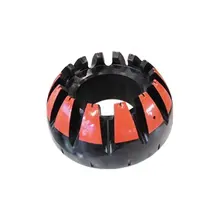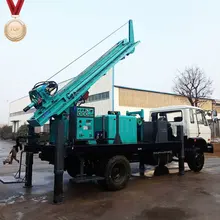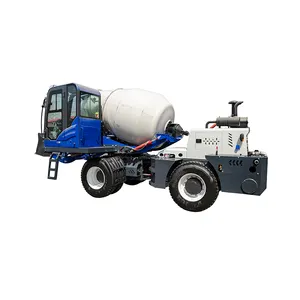What is Cement Mixer For Small Projects
Cement mixers, also known as concrete mixers, are specialized devices designed to combine cement, sand or gravel, and water to form concrete. They are essential tools in the construction industry for anyone involved in building projects, whether it be for small home constructions or larger commercial undertakings. These mixers are particularly useful for compact spaces and small projects where the volume of concrete required is not substantial enough to warrant the use of a full-size truck mixer or a stationary mixing plant.
The principle behind a cement mixer is simple: it uses a rotating drum, which is mounted on a shaft, to mix the ingredients. The materials are added to the drum along with water, and the rotation of the drum ensures that all components are evenly distributed and mixed. This process can be either batch or continuous, with the former mixing a specific quantity of materials at a time, while the latter allows for a continuous supply of concrete. The design of the cement mixer can vary from a small, portable unit that can be moved by one person to larger models that are stationary and require more space.
Cement mixers are used by professionals in the construction industry, such as builders, contractors, and concrete specialists. These devices have also become indispensable for small-scale DIY projects or for rental services that cater to homeowners who may need to mix concrete for patios, driveways, or small additions to their property. The efficiency and reliability of a cement mixer can significantly impact the productivity and success of a project, making it important for users to select the appropriate type and size for their specific needs.
Types of Cement Mixer for Small Projects
In the realm of cement mixers for small projects, several types stand out due to their specific design and functionality:
-
Portable Cement Mixers: These are smaller in size and can be moved around more easily, making them ideal for small repair jobs or DIY projects. Their capacity typically ranges from 100 to 300 pounds.
-
Mini Mixers: Even more compact than portable models, mini mixers are suited for very small projects or for working in tight spaces. Their capacity is often around 50 pounds.
-
Electric Cement Mixers: These are powered by electricity and are suitable for indoor use where a ready supply of power is available. They come in various sizes to accommodate different project scales.
-
Gas-Powered Mixers: With a higher capacity than electric models, gas-powered cement mixers are better suited for larger projects. They can be used outdoors where an electric supply is not available.
How to choose Cement Mixer For Small Projects
Selecting the right cement mixer for small projects is essential for ensuring efficiency and quality results. For businesses involved in construction works or manufacturing plants, several factors should be considered when choosing a cement mixer:
-
Project Scale: Determine the size of your project. Smaller endeavors like home use or small-scale commercial applications may only require a basic electric or hand-cranked mixer. For larger operations such as manufacturing plants or construction sites, consider more robust options like diesel-powered or gas-powered models.
-
Mixing Requirements: Assess the volume of concrete needed for your project. Drum capacity can range from 50 liters for small home use models to over 500 liters for industrial applications. Consider how frequently you'll use the machine and choose one with adequate capacity.
-
Portability Needs: If your project involves moving the mixer between sites or within a large facility, look for models with wheels and sturdy handles.
-
Mixing Quality: Ensure that the mixer can produce an even blend of materials without lumps or dry spots, which will affect the integrity of your concrete work.
-
Ease of Use and Maintenance: Opt for models that are user-friendly and require minimal maintenance, especially if you're operating in remote locations or where technical support is limited.
By carefully considering these factors in relation to your specific needs and consulting with industry experts if necessary, businesses can make informed decisions when purchasing cement mixers for their operations.
About Cement Mixer For Small Projects on Alibaba.com
For businesses looking to procure reliable equipment for small-scale construction projects, Alibaba.com stands out as a global marketplace connecting buyers with a vast network of suppliers offering an array of cement mixers. Whether you're working on residential developments or large-scale industrial applications, Alibaba.com facilitates access to machinery that aligns with diverse business requirements across over 190 countries.
Alibaba.com's platform is designed with user-friendly features that simplify the selection process. Buyers can compare different models based on specifications like capacity, power source, material construction, and even local service locations. This ensures that businesses find equipment that not only meets their immediate needs but also fits their operational setup.
Moreover, Alibaba.com emphasizes secure transactions with services such as Trade Assurance that protect payments until buyers confirm satisfactory delivery of their orders. This commitment to facilitating safe and trustworthy trade relationships reinforces why businesses should consider purchasing from Alibaba.com when looking for quality cement mixers that can endure the demands of various construction applications.
Common FAQs for Cement Mixer For Small Projects
What is the benefit of using a cement mixer with a hydraulic system?
A hydraulic system in a cement mixer offers more consistent and thorough mixing of materials, which can lead to higher quality concrete with fewer imperfections.
How do I determine the right size and type of cement mixer for my business?
Consider the volume of material your business needs to mix, the types of materials you will be working with, and the space available for the mixer on your premises. Manual drum mixers are ideal for smaller volumes, while larger towable or concrete mixers are suitable for bigger jobs.
What are the key maintenance requirements for a cement mixer?
Regular maintenance for a cement mixer includes cleaning the drum, checking the engine and hydraulic systems, and ensuring that all safety features are functional. The frequency of these checks will depend on the usage conditions.
Can I use a cement mixer for other materials besides concrete?
While cement mixers are primarily designed for concrete, some models may be adaptable to mix other materials with similar consistencies. However, it's important to choose a mixer designed for the specific materials you will be working with.
Is it possible to get a cement mixer that can operate on different types of voltage?
Yes, it is possible to find cement mixers that are compatible with various voltage requirements. Always verify the power supply specifications to ensure compatibility with your local electrical standards.
How does the hopper capacity affect my choice of cement mixer?
The hopper capacity determines the volume of material that can be mixed at one time. A larger hopper capacity is suitable for high-volume jobs, whereas a smaller hopper may suffice for small-scale applications or where space is limited.
What is the difference between a manual drum mixer and a mechanical drum mixer?
Manual drum mixers require physical effort to rotate the drum and are typically used for smaller volumes or occasional use. Mechanical drum mixers use electricity or hydraulics to rotate the drum, making them more efficient for larger volumes and continuous operation.
Can I get a customized cement mixer tailored to my business's specific needs?
Many suppliers on Alibaba.com offer customized support such as OEM and ODM services to tailor cement mixers to your business's unique requirements.
What after-sales services are important when buying a cement mixer?
After-sales services like online support, video technical support, engineers available to service machinery overseas, and field maintenance can be crucial for ensuring continuous operation and minimizing downtime.






























 浙公网安备 33010002000092号
浙公网安备 33010002000092号 浙B2-20120091-4
浙B2-20120091-4